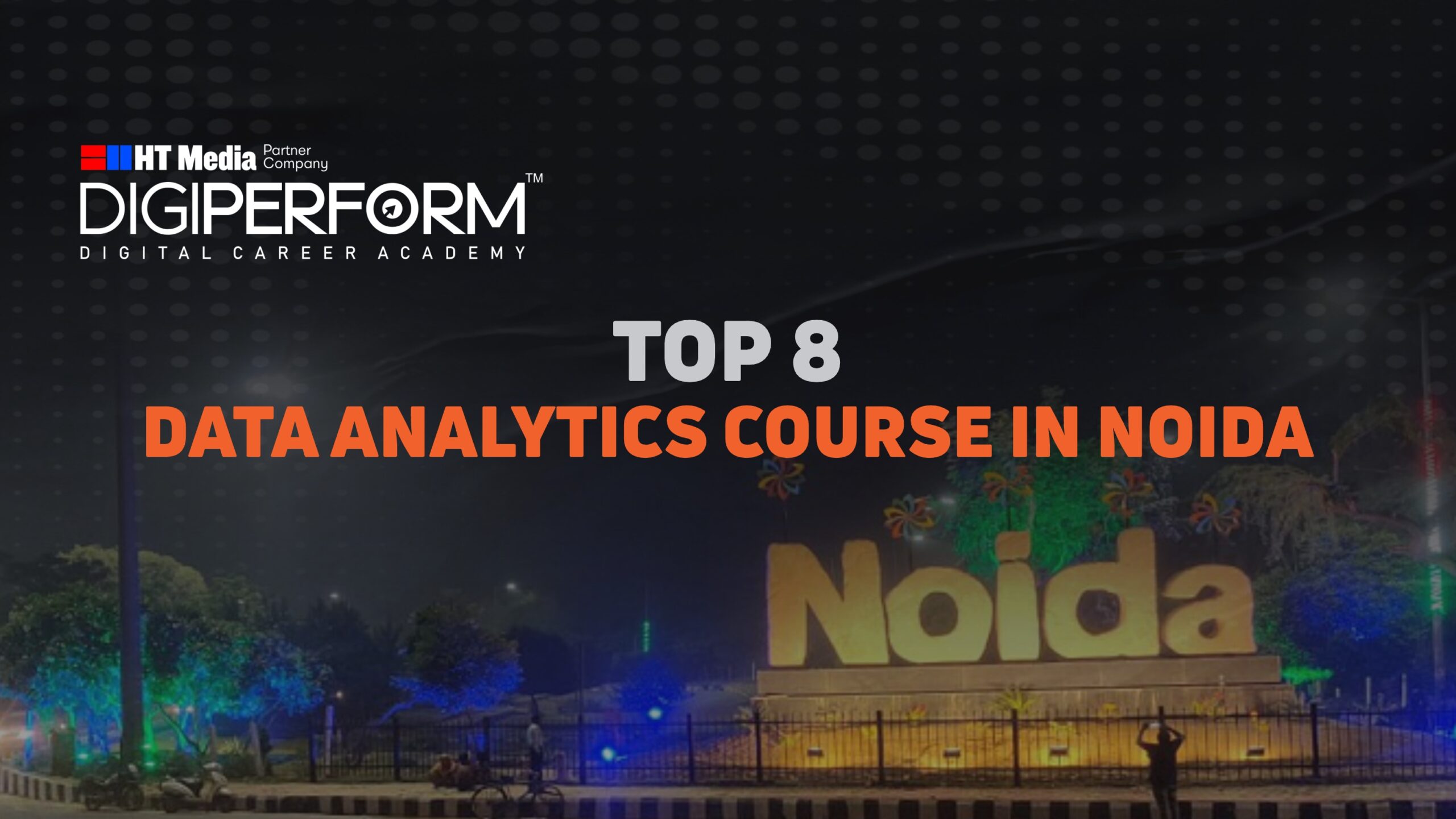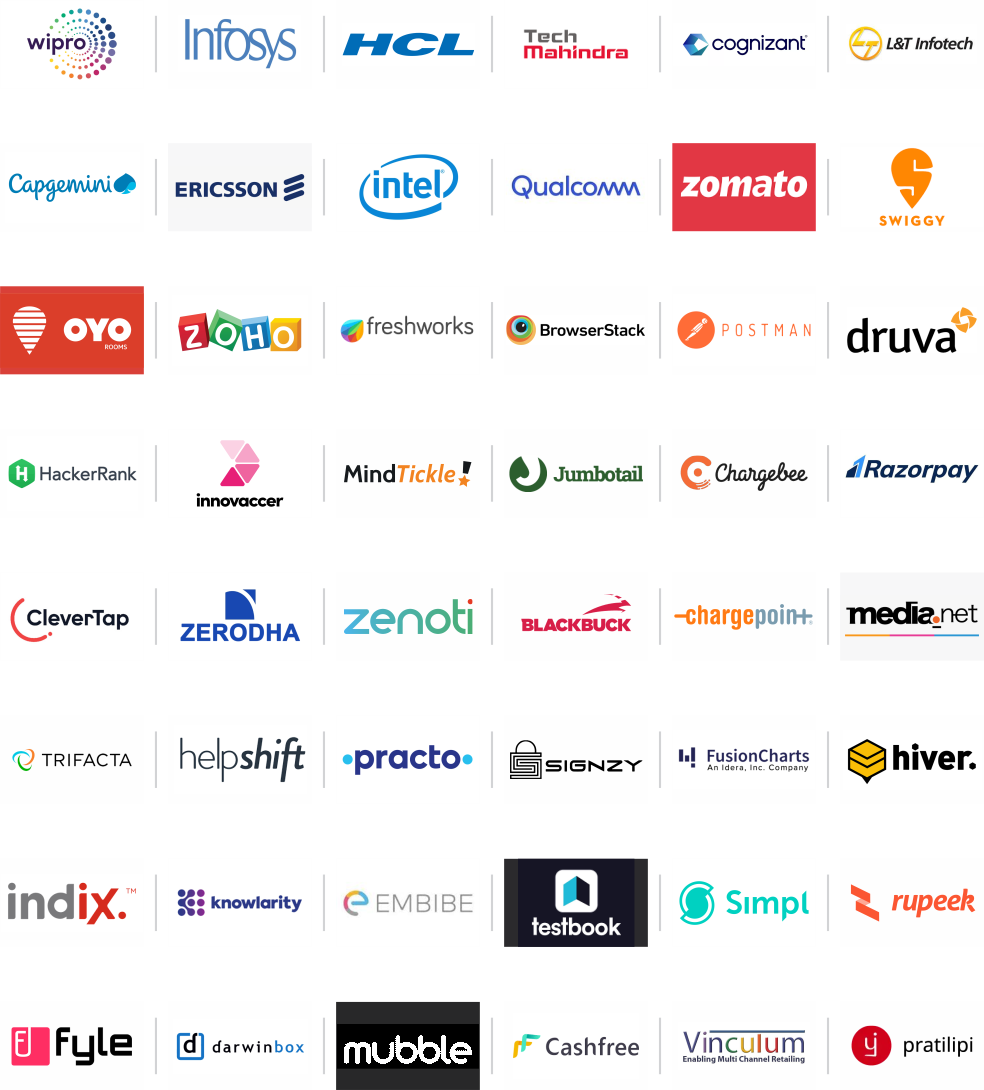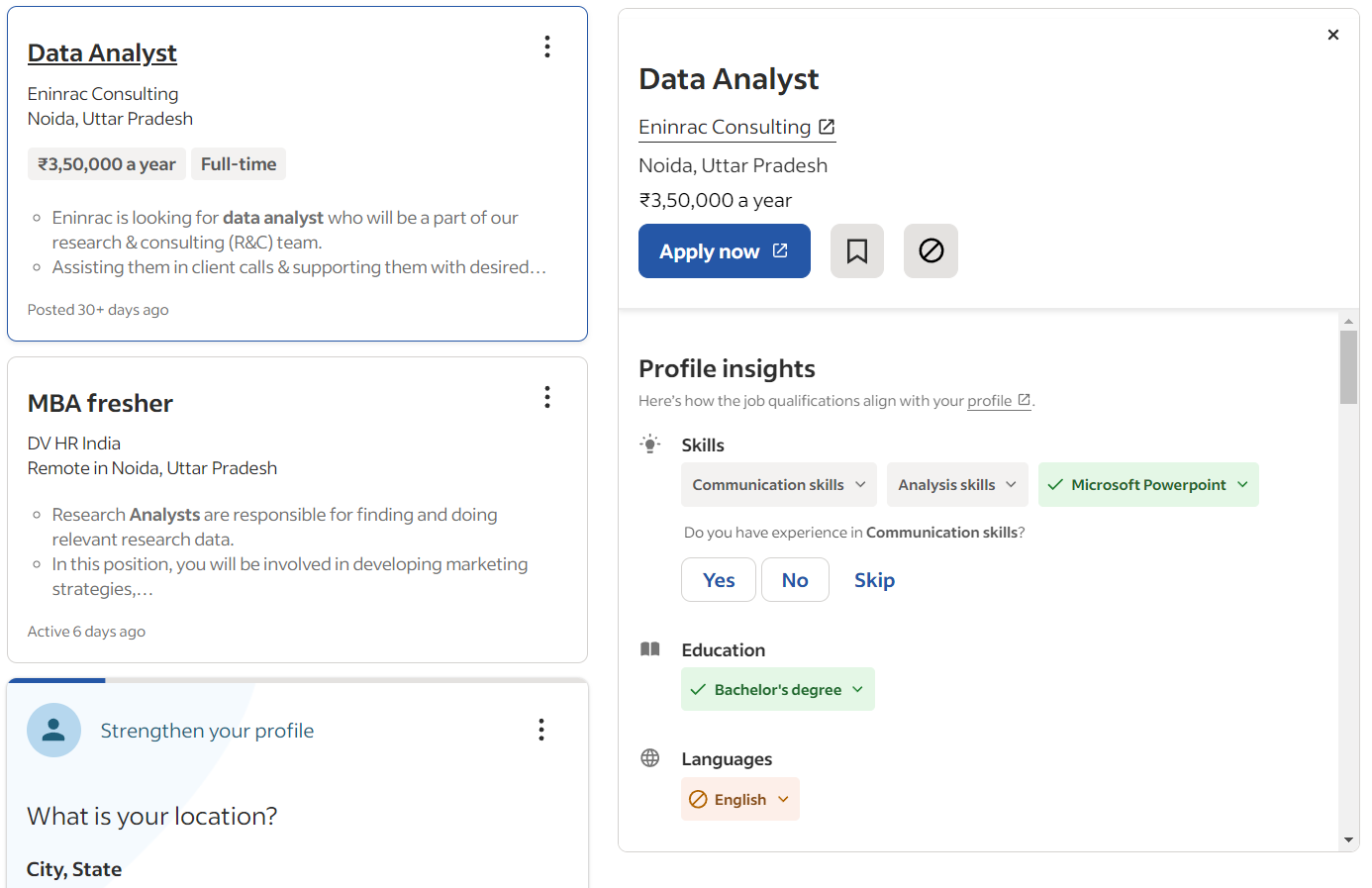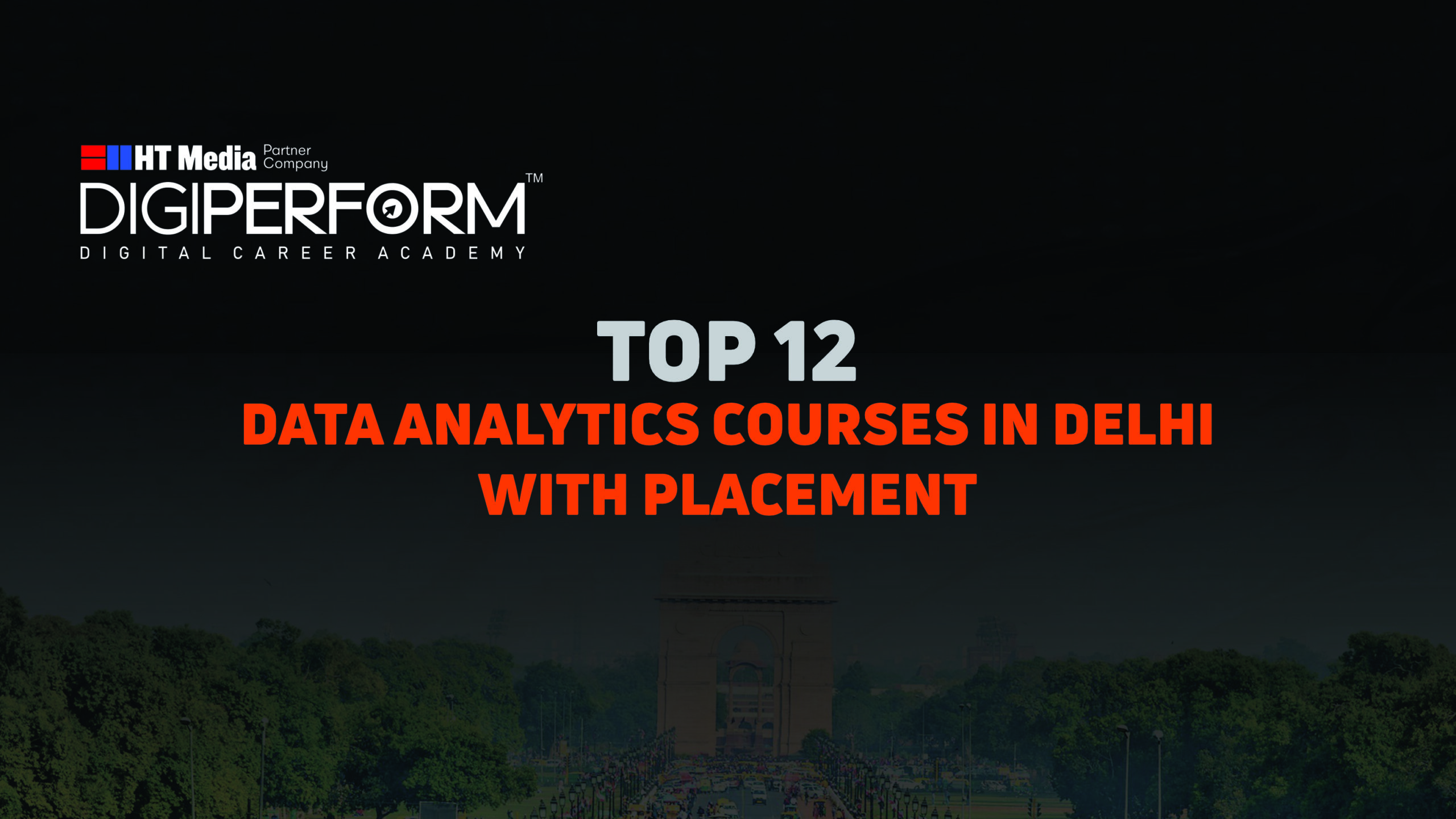Master
Data Analytics Training In Noida
India’s Only Data Science Training Program created to help you to build a successful career in Data Science from scratch.
Top 8 Data Analytics Course In Noida
Welcome to our list of the Top 8 Data Analytics Training In Noida!
Noida, located in the northern part of India’s National Capital Region, is rapidly becoming a key player in the field of Business/Data analytics. Known for its modern infrastructure and dynamic business environment, Noida is attracting attention for its technological advancements and innovative approach to data-driven decision-making.
The city’s evolution into a tech hub is marked by the establishment of various educational institutions and training programs focused on business analytics. These initiatives are nurturing local talent and equipping professionals with the skills necessary to excel in the industry.
As Noida continues to embrace digital transformation, the importance of business analytics in optimizing processes, driving innovation, and making informed decisions is becoming increasingly evident. This transformation is positioning Noida as an exciting destination for those looking to pursue a career in business analytics.
In this article, we will explore the Top 8 Data Analytics Training Programs in Noida, highlighting their significance and the benefits of undertaking them in this thriving city.
Comparison Chart: Top 8 Data Analytics Training In Noida
If you are looking for the best and most reliable information regarding Business/Data Analytics Training In Noida, then you have come to the right place.
| Institute Rank | Name | Training Delivery Type | Offering Course Since | Fees | Placement Assistance |
| 1 | Digiperform | Online/offline | 2013 | INR 30,000 +GST | 100%* |
| 2 | Structured Learning Assistance | Online/Offline | 2018 | INR 29,500 | 100% |
| 3 | INNOZANT | Online/ Offline | 2015 | INR 30,000 | 100% |
| 4 | AnalytixLabs | Offline/online | 2011 | INR 6,387 EMI and WITH PAY AFTER PLACEMENT | 100% |
| 5 | Gvtacademy | Offline/online | 2014 | INR 20,000 | 100% |
| 6 | ConsoleFlare | Online | 2018 | INR 28,500 | 100% |
| 7 | ExcelR | Offline/online | 2015 | INR 40,000 | 100% |
| 8 | DigiCrome Academy | Online | 2011 | INR 20,000 | 100% |
What is Data Analytics?
Data analytics is the process of examining data to uncover insights and trends that can be used to make informed decisions. It involves collecting, cleaning, analyzing, and interpreting data using statistical and other techniques.
In simpler terms, data analytics is about turning raw data into useful information.
Key steps in data analytics:
- Data Collection: Gathering relevant data from various sources.
- Data Cleaning: Preparing the data by removing errors, inconsistencies, and missing values.
- Data Analysis: Applying statistical techniques and data mining methods to uncover patterns and relationships.
- Data Interpretation: Interpreting the findings and drawing meaningful conclusions.
Data analytics is used in various fields, including:
- Business: Making informed decisions about marketing, finance, operations, and customer service.
- Healthcare: Improving patient outcomes and reducing costs.
- Government: Understanding public policies and making evidence-based decisions.
- Science: Conducting research and making scientific discoveries.
- Sports: Analyzing player performance and developing winning strategies.
Difference between Data Analytics And Business Analytics
Data Analytics and Business Analytics are closely related fields, but they serve different purposes and have distinct focuses. Here’s a breakdown of the key differences:
1.Purpose
- Data Analytics: Primarily focuses on analyzing raw data to uncover trends, patterns, and insights. It’s about interpreting data to make data-driven decisions.
- Business Analytics: Uses data analytics techniques to address specific business problems or opportunities. It’s more about applying data insights to improve business outcomes, such as increasing profits, reducing costs, or improving efficiency.
2.Scope
- Data Analytics: Broad and can be applied in various fields such as healthcare, finance, marketing, and more. It deals with any type of data analysis, whether it’s related to business, science, or other domains.
- Business Analytics: Narrower in scope, focusing specifically on business contexts. It’s about applying data analysis to business problems, often involving financial data, customer data, and operational data.
3.Techniques Used
- Data Analytics: Involves a wide range of techniques such as descriptive analytics, predictive analytics, and prescriptive analytics. It uses statistical analysis, machine learning, and data mining.
- Business Analytics: Often utilizes the same techniques but with a focus on business strategy and decision-making. It may also involve more business-specific tools and frameworks, like SWOT analysis, Balanced Scorecard, or ROI analysis.
4.Tools
- Data Analytics: Uses tools like Python, R, SQL, Excel, and specialized software like Tableau, SAS, or Apache Hadoop for large-scale data processing.
- Business Analytics: May use similar tools but often includes business-specific platforms like SAP, Oracle Business Intelligence, or Microsoft Power BI, which are designed for business data analysis.
5.Outcome
- Data Analytics: The outcome is often a set of insights or data visualizations that describe or predict trends.
- Business Analytics: The outcome is actionable business strategies and decisions, often focused on improving business performance.
6.Audience
- Data Analytics: Often serves data scientists, analysts, or any professionals dealing with data across various domains.
- Business Analytics: Tailored more towards business professionals, managers, or executives who are looking to leverage data to make informed business decisions.
Top 8 Data Analytics Training In Noida
1. Digiperform
Digiperform, a leading academy for business/data analytics training institute and certification in Noida, provides valuable courses at competitive prices. Graduates from Digiperform have secured positions with top brands, backed by Digiperform’s recognized certifications.
The curriculum is meticulously designed and regularly updated by a panel of over 50 data analytics experts, incorporating insights from 450 seasoned professionals across Asia. This approach ensures that the curriculum is aligned with industry needs and includes practical training through exercises, research, and assignments.
Why Choose Digiperform Online Business/Data Analytics Course?
Digiperform offers a comprehensive online business/data analytics training course that equips you with the skills and knowledge needed to succeed in today’s data-driven world. Here are some reasons why you should choose Digiperform:
1. Industry-Relevant Curriculum:
- Real-World Applications: Learn from experienced professionals who have worked in various industries, ensuring that the curriculum is up-to-date and relevant to current market trends.
- Hands-On Projects: Gain practical experience through hands-on projects that simulate real-world scenarios, allowing you to apply your knowledge and develop problem-solving skills.
2. Experienced Instructors:
- Industry Experts: Learn from experienced data analysts and data scientists who have a deep understanding of the field and can provide valuable insights.
- Mentorship: Receive personalized guidance and mentorship from your instructors, who are committed to your success.
3. Flexible Learning Options:
- Self-Paced Learning: Learn at your own pace, without the constraints of a traditional classroom schedule.
- Live Online Classes: Participate in live online classes with interactive discussions and Q&A sessions.
- Recorded Lectures: Access recorded lectures for review and reference.
4. Career Support:
- Job Placement Assistance: Benefit from Digiperform’s career support services, including resume building, interview preparation, and job placement assistance.
- Networking Opportunities: Connect with other students and industry professionals through networking events and online communities.
5. Affordable Pricing:
- Competitive Fees: Enjoy competitive pricing for high-quality education without breaking the bank.
- Flexible Payment Options: Choose from flexible payment options to suit your budget.
Data Analytics Online Course: Advantages
Online business/data analytics courses offer a flexible and convenient way to learn valuable skills. Here are some of the key advantages:
1. Flexibility and Convenience:
- Self-Paced Learning: Learn at your own pace, without the constraints of a traditional classroom schedule.
- Remote Access: Access course materials and assignments from anywhere with an internet connection.
- Work-Life Balance: Balance your studies with work and personal commitments.
2. Cost-Effective:
- Lower Tuition: Online courses often have lower tuition fees compared to traditional programs.
- No Commute Costs: Save money on transportation and other expenses associated with attending in-person classes.
3. Diverse Course Offerings:
- Wide Range of Topics: Choose from a variety of data analytics training course, including introductory, advanced, and specialized topics.
- Global Instructors: Learn from experts around the world with diverse perspectives and experiences.
4. Interactive Learning:
- Online Forums: Connect with other students and instructors through discussion forums.
- Virtual Classrooms: Participate in live online lectures and workshops.
- Hands-On Projects: Work on practical assignments and projects to apply your knowledge.
5. Career Advancement Opportunities:
- Skill Development: Gain in-demand skills that can boost your career prospects.
- Certification: Earn industry-recognized certifications to validate your expertise.
- Networking: Connect with other professionals in the field through online communities.
6. Accessibility:
- Remove Barriers: Online courses can make learning accessible to individuals with disabilities or those who live in remote areas.
- Flexible Learning Options: Choose from a variety of course formats, such as video lectures, interactive quizzes, and hands-on projects.
Data Analytics Course Syllabus
Module 1: Introduction to Data Science | Introduction to the Industry & Buzzwords Industrial application of data science Introduction to different Data Science Techniques Important Software & Tools Career paths & growth in data science |
Module 2: Introduction to Excel | Introduction to Excel- Interface, Sorting & Filtering, Excel Reporting- Basic & Conditional Formatting Essential Excel Formulae Layouts, Printing and Securing Files |
Module 3: Introduction to Stats | Introduction to Statistics & It’s Applications Different types of Data Population vs Sample Sampling Techniques Intro: Inferential vs. descriptive statistics |
Module 4: Descriptive Stats Using Excel Datasets | Categorical Variables Visualization Using Excel Charts- FDT, Pie Charts, Bar Charts & Pareto Numerical Variables Visualization of Frequency & Absolute Frequency- Using Histogram, Cross Table & Scatter Plot Measure of Spread ( Mean, Mode , Median) Measure of Variance( Skewness, SD, Variance, Range, Coef. Of Variance, Bivariate Analysis, Covariance & Correlation) |
Module 5: Inferential Stats Using Excel Datasets | Introduction to Probability Permutation & Combinations Types of events Normal distribution Standard Normal distribution Normal vs. Standard Normal distribution Confidence Intervals & Z-Score Hypothesis Testing & It’s Types |
Module 6: Data Visualization Using Tableau | Introduction to Tableau Introduction What is Data Analytics? Why Data Visualisation? What is Tableau? Why Tableau? Tableau vs Excel and PowerBI Exploratory and Explanatory Analysis Getting started with Tableau Visualizing and Analyzing data with Tableau – I Introduction Bar Charts Line Charts and Filters Area Charts Box plots and Pivoting Maps and Hierarchies Pie Charts Treemaps and Grouping Dashboards Visualizing and Analyzing Data with Tableau – II Introduction Joins and Splits Numeric and String functions Logical and Date functions Histograms and parameters Scatter Plots Dual Axis Charts Top N Parameters and Calculated Fields Stacked bar Charts Dashboards – II and Filter Actions Storytelling Summary |
Module 7: PowerBI | Core Concepts Introduction to Business Intelligence and Power BI Power BI Desktop Interface Data Sources and Connectivity Power Query Editor (Data Transformation) Data Modeling and Relationships DAX (Data Analysis Expressions) Creating Reports and Visualizations Dashboards and Interactive Reports Publishing to Power BI Service Sharing and Collaboration Advanced Topics Power BI Dataflows Power BI Embedded Role-Based Security Data Analysis Patterns Performance Optimization Custom Visuals AI and Machine Learning Integration |
Module 8: Database Design & RDBMS | Database Concepts: Introduction to databases, DBMS, database system architecture Data models (hierarchical, network, relational, object-oriented Data independence, schemas, instances Three-schema architecture Entity-Relationship (ER) Modeling Entities, attributes, relationships Cardinality and modality ER diagrams Relational Database Model: Relations, attributes, tuples, keys Integrity constraints (entity, referential) Relational algebra and calculus SQL (Data Definition Language, Data Manipulation Language, Data Control Language) Database Design: Functional dependencies Normalization (1NF, 2NF, 3NF, BCNF) Categorical – Categorical Analysis Transactions: ACID properties Concurrency control (locking, timestamping) Recovery techniques |
Data Analytics Projects and Assignments
Major Projects
Customer Lifetime Value Calculation: The project involves calculating the customer lifetime value using SQL to understand the revenue generated by a customer over their lifetime.
Customer Churn Prediction: This project involves building a predictive model using SQL to identify customers who are likely to churn based on their behavior and transaction history.
Interactive Dashboard for E-Commerce Sales: The project involves creating an interactive dashboard using Tableau & SQL to analyze retail sales data, identify trends, and make data-driven decisions.
Customer Segmentation Dashboard: This project involves creating a customer segmentation dashboard using Tableau to identify customer groups based on demographics, behavior, and purchasing patterns.
Movie Recommendation System: The project involves building a movie recommendation system using Python and its libraries such as Pandas, NumPy, and Scikit-Learn. The recommendation system will suggest movies based on user preferences and ratings.
Sentiment Analysis on Twitter Data: This project involves analyzing Twitter data using Python and its libraries such as NLTK and TextBlob to perform sentiment analysis and understand the overall sentiment of a particular topic.
Visualizing COVID-19 Data: The project involves visualizing COVID-19 data using Python and its libraries such as Matplotlib, Seaborn, and Plotly to understand the impact of the pandemic on different countries and regions.
Visualizing Stock Market Data: This project involves visualizing stock market data using Python and its libraries such as Pandas, Matplotlib, and Bokeh to understand the trends and patterns in stock prices over time.
Airbnb Data Analysis: The project involves performing exploratory data analysis on Airbnb data to understand the patterns in the pricing, availability, and quality of Airbnb listings in different cities.
Bike Sharing Data Analysis: This project involves performing exploratory data analysis on bike sharing data to understand the usage patterns of bikes in different cities and identify factors that influence bike usage.
House Price Prediction: The project involves building a regression model using Python and its libraries such as Scikit-Learn to predict the prices of houses based on their features such as location, size, and amenities.
Credit Risk Prediction: This project involves building a classification model using Python and its libraries such as Scikit-Learn to predict the credit risk of loan applicants based on their credit history and other factors.
Time Series Forecasting for Sales Data: The project involves building a time series forecasting model using advanced machine learning algorithms such as ARIMA and LSTM to predict future sales trends and identify factors that influence sales.
Sentiment Analysis on Product Reviews: The project involves building a sentiment analysis model using NLP techniques such as Word Embeddings and Recurrent Neural Networks (RNN) to analyze product reviews and understand the sentiment of customers towards different products.
Segmentation using Deep Learning: This project involves using advanced deep learning techniques such as Fully Convolutional Networks (FCN) and U-Net to perform image segmentation and identify objects in images.
Machine Translation using Transformers: This project involves building a machine translation model using advanced deep learning techniques such as Transformers to translate text from one language to another.
Case Studies & Assignments:
- Healthcare Customer Feedback Analysis
- Management Teams Dashboard Creation
- Retail Store Sales Report Analysis
- Software Firm Employee Data Analysis
- Industrial Data Sets Classification & Comparison
- Charts & Graphs: Frequency Distribution Table, Pie-charts, Pareto Diagram, Histogram, Scatter Plots, Heatmaps, Bar Graphs and many More.
- Patient Disease Probability Analysis Using Healthcare Data
- Car Model & Menu Item Data Combination & Configuration Probability Analysis
- Manufacturing & Product Launch Data Classification & Analysis
- Customer Complaint Resolution Analysis Using Normal Distribution Curves
- Product Rating & Employee Productivity Analysis Usign Z-Score
- New Product Need Analysis Using Hypothesis Testing
- Inventory Management & Customer Segmentation Systems Using Vlook up & Hlook Lookup
- Sales Trend & Staffing Plan Creation using Pivot Tables
- Pricing Strategy & Financial Model Creation Using What if Analysis
- Sales & Operations Dashboard Creation
- Healthcare & Construction Reporting Automation Using Macros
- Retail Sales Opportunity Analysis Using PIVOT Charts
- Accounting Firm Statement Analysis Using Sparklines & Waterfall Chart
- FMCG Marketing Spend to Sales Revenue Impact Analysis Using Regression Analysis
- Transportation Pricing Model Using Regression Analysis
Data Analytics Placements
100% * Placement Assistance Dedicated Placement Cell To Help You Land Your Dream Job
Data Analytics course fees
Master Program in Business Analytics Fees: 30k-90k
Contact Information
Digiperform Corporate Office: C-30, Third Floor, Sector-2, Near Sec-15 Metro Station, Noida, Uttar Pradesh 201301, India
Email: contact@digiperform.com
Phone: +91-8527-611-500
Website: www.digiperform.com
2. QBI Institute
QBI institute provides Business/Data analytics training institute in Noida. We are a team of experienced business analysts, business consultants, domain experts and leaders. We have one passion that is to share and disseminate skills and expertise. Our team has worked and consulted with Top IT companies and Fortune 500 clients. Each of our consultants and trainers have 12 + years of experience, got educated from IITs or IIMs and worked with top IT companies in India and abroad.
Course Curriculum:
- IT Industry Fundamentals for Business Analysts
- Business Analysis Essentials
- Business Process Analysis
- Data Analysis Course
- Big Data
- Requirements Process – The Core of Business Analysis Activity
- Stakeholder Analysis and Management
- UML- Unified Modeling Language for the Business Analyst
- Microsoft Visio for the Business Analyst
- Business Process Model and Notation
- Bizagi Business Process Modeler
- Business Analysis Techniques
- Requirements Elicitation, Collaboration and Techniques
- Requirements Analysis
- Wireframes and Prototypes
- Requirements Documentation – BRD, FRD, SRS Preparation
- Agile Business Analysis
- SQL and Database Concepts for the IT Business Analyst
- Software Test Management & User Acceptance Testing for the IT Business
- Analyst
- Power BI Visualization for the Business Analyst
- Chat GPT & AI Enablement for the Business Analyst
| Name | QBI INSTITUTE |
| Course Duration | 3-4 Months |
| Website | https://www.qbi.in/ |
| Address: | QBI Institute c/o Vatika Business Centre 4th Floor Tower Number 1 at Okaya Building B-5 , Sector 62 Noida, UP 201301, India |
| Avg. Google Rating: | 4.9 |
| Offering Data Analytics Course in Noida Since: | 2010 |
| Fees | INR 30,000 |
| Branches in India: | 1 |
| Exclusive Data analytics: | NO |
| Flagship Course Names: | NA |
| Training Delivery Model | Online |
3. Structured Learning Assistance
SLA Consultants Noida offers adequate training with the right platform to the aspiring Business Analyst by offering them high quality and globally recognized Business Analyst Training in Noida. The Business Analyst Training in Noida structured learning assistance provides essential lessons and understanding to the participant to become a professional business analyst within a short span of time.
Anyone is eligible to attend the Business Analysis in MS Excel Training Program as long as they have a graduation degree in IT field. The business analyst course in Noida is specifically designed by expert corporate trainers who will also be responsible for educating the students using Innovative business analyst course with placement in Noida techniques and highly updated Business Analyst course content which would offer the applicant with full-fledged and job specific knowledge in Business Analysis tools. The Business Analyst Training in Noida will benefit fresher college graduates.
Course Curriculum:
- basic and advanced excel with dashboard and excel analytics
- VBA/ macros – automation reporting. user form and dashboard
- SQL and ms access
- tableau ms power BI
- python R programming
- python data science and machine learning
| Name | Structured Learning Assistance |
| Course Duration | 4-5 Months |
| Website | https://slaconsultantsnoida.in/ |
| Address: | E-48, First Floor, Sector 3, Near Sector 16 Metro Station Noida, Uttar Pradesh, 201301 |
| Avg. Google Rating: | 4.9 |
| Offering Data Analytics Course in Noida Since: | 2018 |
| Fees | INR 29,500 |
| Branches in India: | 3 |
| Exclusive Data analytics: | NO |
| Flagship Course Names: | NA |
| Training Delivery Model | Online & offline |
4. INNOZANT
Innozant brings you 9-month skill achiever training in the form of business analytics training in Noida to impart the necessary and demanded business Analytical skills. Here we give your insight about what Industry expects from its employees, thus empowering them to acquire industry specific training and develop right aptitude and technical competence. Our certification programs target graduates/ under-graduate’s student and those working professionals who either want to enter or switch into the vast field of business analytics.
Course Curriculum:
- MS Excel: How to Organize, Analyze & Calculate the data.
- SQL Analytics
- Big Data
- Power BI
- VBA Macros Automation
- Python Data Analytics tool
| Name | INNOZANT |
| Course Duration | 8-9 Months |
| Website | https://www.innozant.com/ |
| Address: | E-57, First Floor, Sector-3, Near Sec-16 Metro Station, Noida, Uttar Pradesh, 201301 |
| Avg. Google Rating: | 4.9 |
| Offering Data Analytics Course in Noida Since: | 2015 |
| Fees | INR 30,000 |
| Branches in India: | 3 |
| Exclusive Data analytics: | NO |
| Flagship Course Names: | NA |
| Training Delivery Model | Online & offline |
5. AnalytixLabs
India’s top ranked institute for business analytics training in Noida since 2011, we focus on practical and tailored learning to make you job-ready. Latest curriculum, meticulously designed project work and extensive post sessions support is provided for real-world skills, making it worth every penny you invest.
AnalytixLabs pioneers in business analytics training in Noida It is widely acclaimed and known for high quality training programs designed and delivered by industry experts themselves. After establishing ourselves as the best institute for business analyst courses in Noida, we steadily progressed to earn the same reputation globally based on our stellar record and student satisfaction.
Our students are placed in leading companies across industries like Accenture, American Express, Absolut Data, Atria, Bank of America and McKinsey. We are focused at helping our clients develop skills in basic and advanced analytics to enable them to emerge as “Industry Ready” professionals and enhance their career opportunities.
Course Curriculum:
-
Data Analysis Course
-
Data Visualization and Analytics
-
Data Analytics with Python
-
Predictive Modelling and Introduction to ML
-
R for Data Science (Optional eLearning)
-
data analytics & visualization with excel
-
data analytics with SQL
-
big datadata analytics & visualization with power BI
-
data analytics with VBA
| Name | AnalytixLabs |
| Course Duration | 5-6 Months |
| Website | https://www.analytixlabs.co.in/ |
| Address: | Metro Gate 3, A 78, 1st Floor, A Block, Sector 2, Noida, Uttar Pradesh 201301 |
| Avg. Google Rating: | 4.9 |
| Offering Data Analytics Course in Noida Since: | 2011 |
| Fees | INR 6,387 EMI |
| Branches in India: | 3 |
| Exclusive Data analytics: | NO |
| Flagship Course Names: | NA |
| Training Delivery Model | Online & offline |
6. Gvtacademy
GVT Academy Noida provides best MIS, Online business analytics training in Noida, we are Noida Based Online Training and development Company works on current industry standards that help candidates to improve their skills and got their dream jobs at top Companies.
GVT Academy Provides best institute for learning business analytics in Noida. GVT is one of the most reliable Online MIS training institutes in Noida sector 63 provide practical Commands and you make ready for the job with basic and Online advanced level Online MIS training courses.
At GVT Online business analytics training in Noida is led by subject matter experts skilled persons with 10+ years of experience in Online MIS and Advanced Excel projects. GVT Academy executes Practical training sessions for Students into Professionals that are very helpful to recruit within the industry.
| Name | Gvtacademy |
| Course Duration | 4-5 Months |
| Website | https://gvtacademy.com/ |
| Address: | Lower Ground 07, H120, H Block, Sector 63, Noida, Uttar Pradesh 201301 |
| Avg. Google Rating: | 4.8 |
| Offering Data Analytics Course in Noida Since: | 2014 |
| Fees | INR 20,000 |
| Branches in India: | 1 |
| Exclusive Data analytics: | NO |
| Flagship Course Names: | NA |
| Training Delivery Model | Online & offline |
7. ConsoleFlare
ConsoleFlare business analytics training in Noida and established as a defiant arriviste to address the issue of disordered information for trending technologies available on the Internet. Due to the expensive cost of these courses, which simply teach methods and did not include any applications or projects, Learners were forced to struggle.
The course instructor had no idea what they were providing because they were unfamiliar with industry practices. Students should continue teaching and strive to qualify for conferences after the course.
Course Curriculum:
- python programming
- data anlytics
- big data
- data analysis course
- importing & handling SQL & other file formats
- data visualizations
- projects
| Name | ConsoleFlare |
| Course Duration | 5-6 Months |
| Website | https://www.consoleflare.com/ |
| Address: | The Office Pass Building, A-93, Sector 4 Near Sector 16 metro station, Noida, Uttar Pradesh 201301 |
| Avg. Google Rating: | 5 |
| Offering Data Analytics Course in Noida Since: | 2018 |
| Fees | INR 28,500 |
| Branches in India: | 1 |
| Exclusive Data analytics: | NO |
| Flagship Course Names: | NA |
| Training Delivery Model | Online |
8. ExcelR
Companies across the globe have taken the approach of analyzing tons of data that they generate as a part of their business. The analysis helps these companies obtain valuable insights that take the profitability to great heights.
Being one of the pioneers of upskilling learners in the business analytics training in Noida, ExcelR has come up with a curriculum that matches the market requirement with great precision. Alongside the curriculum, ExcelR is known for its hallmark service. There is a dedicated assignments team that helps students solve their queries.
Course Curriculum:
- excel
- my SQL
- tableau
- power BI
| Name | ExcelR |
| Course Duration | 5-6 Months |
| Website | https://www.excelr.com/ |
| Address: | Metro, A-77, Sector 2, near Noida, Sector 15, Noida, Uttar Pradesh 201301 |
| Avg. Google Rating: | 4.4 |
| Offering Data Analytics Course in Noida Since: | 2015 |
| Fees | INR 40,000 |
| Branches in India: | 1 |
| Exclusive Data analytics: | NO |
| Flagship Course Names: | NA |
| Training Delivery Model | Online & offline |
How to Become a Data Analyst?
If you’re aiming to become a data analyst, here are the essential steps to guide you:
Step 1: Build a Strong Educational Foundation
Start by pursuing a relevant degree. A bachelor’s degree in one of the following fields will give you a solid grounding for a data analyst role:
- Statistics
- Computer Science
- Mathematics or Economics
- IT Engineering
These areas provide vital knowledge in statistical analysis, programming, and data management, all of which are critical to becoming a data analyst.
Step 2: Acquire Key Technical Skills
To succeed as a data analyst, it’s important to develop strong technical skills. Focus on mastering:
- Programming Languages: R, SAS, and Python
- Data Visualization Tools: Tableau, Power BI, and MATLAB
- Database Management: SQL
- Data Analysis Tools: Excel
Step 3: Gain Hands-On Experience
Practical experience is crucial in this field. Look for opportunities to apply your skills through:
- Internships: Secure internships during your studies to gain real-world experience.
- Projects: Engage in projects that involve data analysis and modeling.
- Freelancing: Take on freelance projects to expand your portfolio.
- Volunteering: Volunteer your skills to research organizations or nonprofits for additional experience.
Step 4: Pursue Advanced Education (Optional)
While not mandatory, an advanced degree can boost your expertise and career opportunities. Consider options such as:
- Master’s in Statistics or Data Science
- MBA with a concentration in Business Analytics
- Post Graduate Program in Data Analytics and Business Intelligence
Advanced degrees often include internships or capstone projects that can further enhance your skills.
Step 5: Earn Relevant Certifications
Certifications can strengthen your resume and showcase your dedication to the field. Some valuable certifications include:
- IBM Certified Data Analyst Professional
- Microsoft Certified: Power BI Data Analyst Associate
- Tableau Desktop Certified Associate
- Python for Data Science and Machine Learning Bootcamp
These certifications validate your technical skills and increase your competitiveness in the job market.
Step 6: Apply for Data Analyst Positions
Once you’ve acquired the necessary education, skills, and experience, you can begin applying for data analyst roles. Some potential job titles include:
- Business Intelligence Analyst
- Data Analytics Associate
- Junior Data Scientist
- Analytics Consultant
Explore opportunities in various industries, such as IT, finance, e-commerce, and consulting.
Step 7: Keep Your Skills Up-to-Date
The field of data analytics is constantly evolving. Stay current with the latest tools and trends by:
- Attending workshops and webinars
- Enrolling in online courses
- Joining professional networks and forums
- Reading industry-related publications
At Digiperform, we provide comprehensive training programs designed to equip you with the knowledge and skills needed to thrive in data analytics. Start your journey with us to unlock the power of data and transform your career.
What is the Importance of Data Analytics?
Data analytics has become an essential component of modern businesses and organizations. It involves the collection, cleaning, analysis, and interpretation of data to extract valuable insights and make informed decisions. Here are some key reasons why data analytics is crucial:
Informed Decision-Making:
- Data-Driven Insights: Data analytics provides businesses with data-driven insights that can inform strategic planning, product development, marketing campaigns, and operational efficiency.
- Reduced Risk: By analyzing data, organizations can identify potential risks and opportunities, enabling them to make more informed decisions and mitigate risks.
Improved Efficiency and Productivity:
- Process Optimization: Data analytics can help identify inefficiencies in processes, allowing for optimization and increased productivity.
- Resource Allocation: By analyzing data, businesses can allocate resources more effectively, ensuring that they are used to their maximum potential.
Enhanced Customer Experience:
- Personalized Experiences: Data analytics can be used to create personalized customer experiences, improving customer satisfaction and loyalty.
- Customer Behavior Analysis: By analyzing customer data, businesses can understand customer behavior and preferences, enabling them to tailor their offerings to meet customer needs.
Competitive Advantage:
- Data-Driven Innovation: Businesses that leverage data analytics can gain a competitive advantage by developing innovative products and services.
- Market Insights: Data analytics can provide valuable insights into market trends and customer preferences, allowing businesses to stay ahead of the competition.
Risk Management:
- Fraud Detection: Data analytics can be used to detect fraudulent activities, protecting businesses from financial losses.
- Predictive Analytics: By analyzing historical data, businesses can predict future trends and risks, enabling them to take proactive measures.
Why Data Analytics is Important for Your Career?
Data analytics is increasingly important for career growth across various industries due to its ability to help businesses make informed, data-driven decisions. Here are a few reasons why data analytics can be crucial for your career:
High Demand for Skills:
With the growing digital economy, companies are collecting vast amounts of data. Professionals who can analyze and interpret this data are in high demand, offering a competitive edge in the job market.
Versatility Across Industries:
Data analytics is applicable in diverse sectors like finance, healthcare, marketing, e-commerce, and more. This flexibility allows you to explore opportunities across multiple fields.
Better Decision-Making:
By understanding data, you can provide insights that lead to smarter decision-making in businesses, improving processes, strategies, and customer experiences. This makes you a valuable asset to any organization.
Higher Earning Potential:
Given the specialized nature of data analytics, professionals with these skills often command higher salaries compared to other fields, especially with experience and advanced expertise.
Career Advancement:
Data analytics skills open doors to leadership roles as companies increasingly rely on data to guide their strategic decisions. This can fast-track your career progression.
Problem-Solving Skills:
Working in data analytics enhances your problem-solving and critical thinking abilities, which are transferable to other areas of your career.
Future-Proof Career:
As technology continues to evolve, data analytics is becoming integral to business strategies. Developing skills in this area ensures that your career stays relevant and adaptable to future trends.
Current Job Openings in Data Analytics In Noida
FAQs: Data Analytics Course
What are the benefits after business analytics?
Better Job Opportunities
Improved Decision-Making
Career Growth
Versatile Skills
Problem-Solving Abilities
Competitive Edge
Efficiency and Productivity
Customer Insights
Risk Management
Innovation and Improvement
Can I get a good job opportunity after completing business analytics?
Yes, you can get a good job opportunity after completing a course in business analytics. Here are some reasons why:
High Demand
Diverse Job Roles
Competitive Salaries
Career Growth
Global Opportunities
Versatility
Impactful Work
How can I become a business analyst?
Here are some few points that can help you to become business analyst:
Understand the Role
Educational Background
Gain Relevant Experience
Develop Key Skills
Certifications
Networking
Build a Strong Resume
Apply for Jobs
Prepare for Interviews
Continuous Learning
Which one is more advantageous, business analytics or data analytics?
Data analysts and business analysts both play key roles in enabling data-driven decisions within their organizations. While data analysts primarily focus on working directly with data, business analysts concentrate more on understanding business requirements and proposing appropriate solutions.
Who earns more data analytics or business analytics?
When comparing salaries between data analysts and business analysts, data analysts generally earn slightly more due to their specialized expertise in managing and interpreting complex data. However, actual earnings can vary based on experience, geographic location, and industry demand.
Is working as a data analyst considered an IT job?
Yes, working as a data analyst is often considered an IT job. Data analysts typically work with technology and data management systems to analyze and interpret complex data sets. Their role involves using various software tools and programming languages to extract insights, making it a key component of the IT field.















